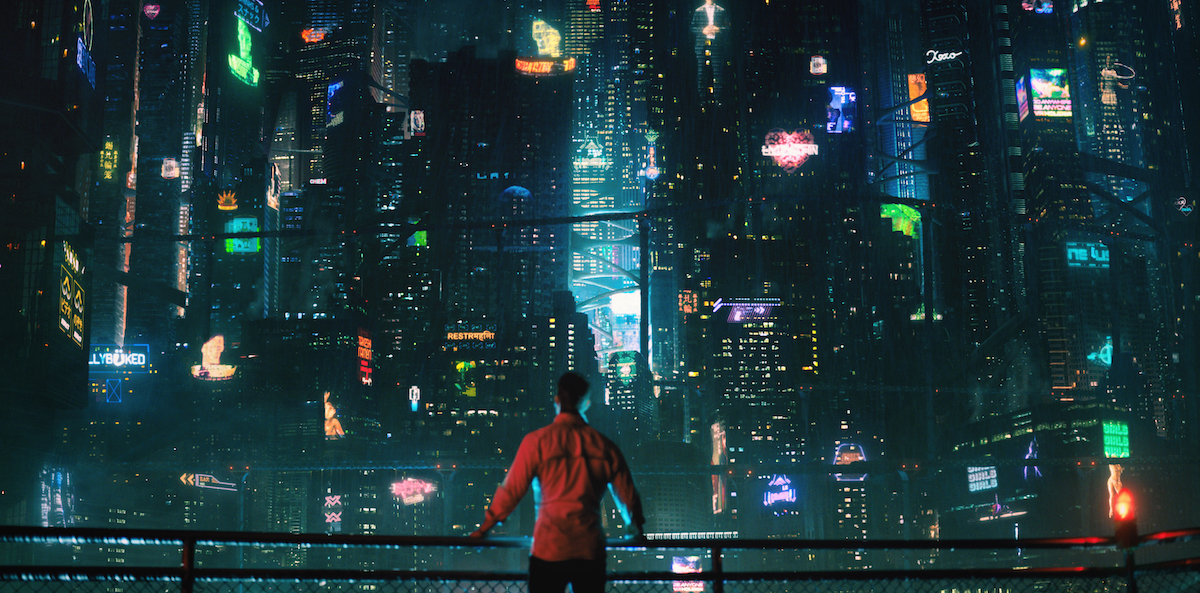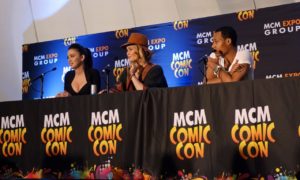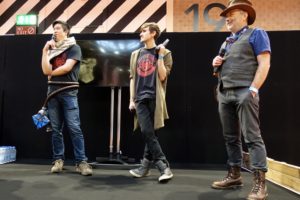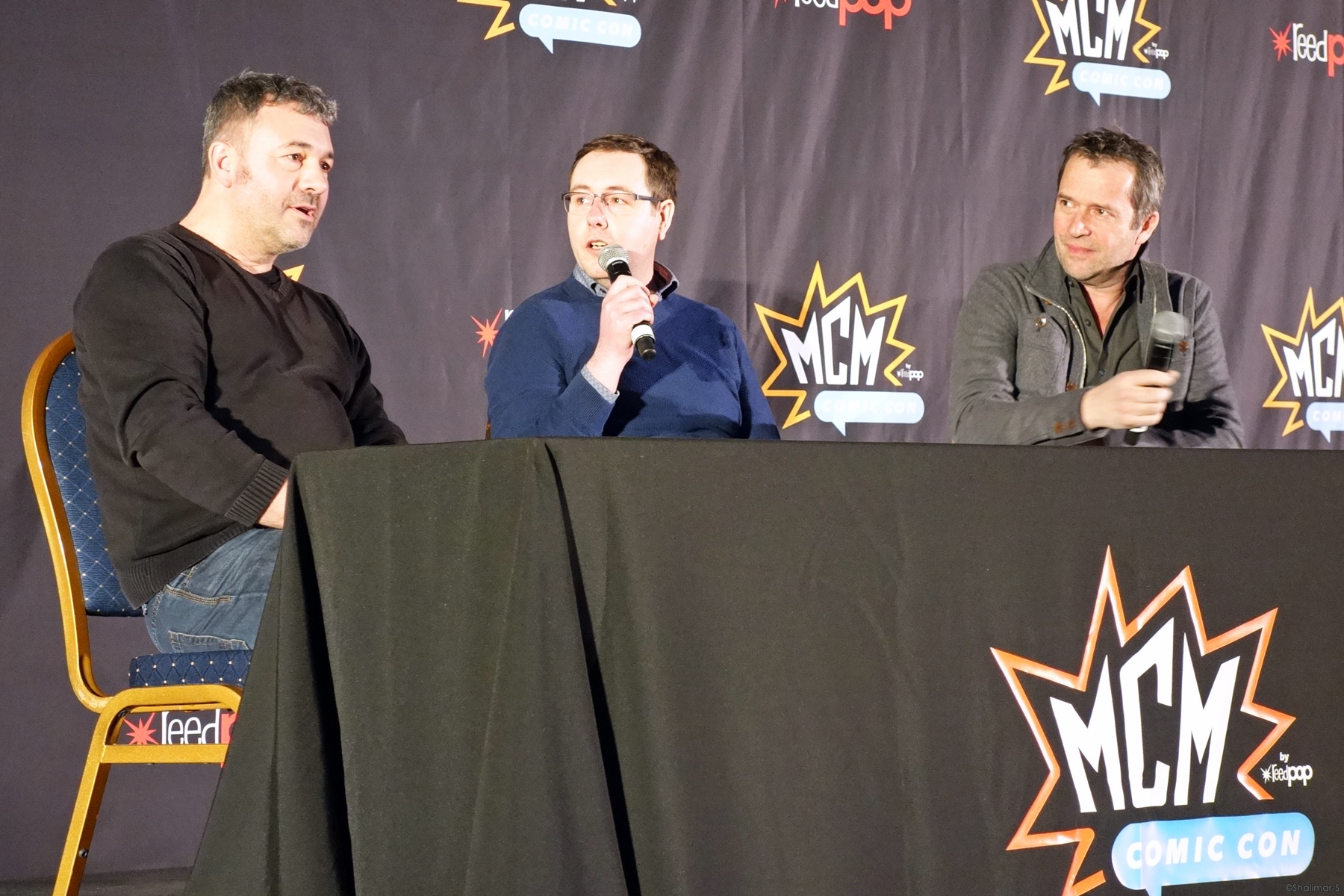
The Saturday of MCM Birmingham Comic Con saw a special panel on Netflix’s original series Altered Carbon. In attendance was the author of the book, Richard Morgan, and one of the stars of the show James Purefoy, who plays Laurens Bancroft.
The panel was hosted Den of Geek’s deputy editor and author of The Geeks Guide to SF Cinema, Ryan Lambie. With the focus on the difficulties that come with adapting a book to the screen, as well as where the idea for Altered Carbon came from, there were also questions about social media and Netflix.
The show itself is set in the year 2384. Humans can now potentially live forever, storing their consciousness in a cortical stack. These stacks can be downloaded into new humans or synthetic bodies, known as ‘sleeves’. Laurens Bancroft (James Purefoy) is one of the richest men in the universe, having used his wealth and power to live up to 350 years. After one of Bancroft’s ‘sleeves’ ends up dead, he decides to ‘wake’ Takeshi Kovacs (Joel Kinnaman), a special forces operative, hiring him to help solve his own murder.
Ryan began the panel by asking his two guests how they felt about the show. “It’s something I wrote down 20 years ago and it’s actually up on a screen at incredible levels of quality and intensity,” replied Richard, adding that when he wrote the book he never dreamed it would ever be adapted for the screen. “It took me about three years to write,” he said. “I wrote it between 1993 and 1997, more or less.” He also mentioned that his major inspiration for the novel was William Gibson and classic noir writers, such as Raymond Chandler and Dashiell Hammett.
James revealed that he had only finished watching the show the night before, calling it “an incredibly dense show.” He also mentioned that during a conversation with Richard, the author advised people not to binge-watch it because it’s too dense. “There are so many moving parts in this show, that we are all very small cogs within it,” said James. “Being able to see it like that and watch it all the way through, you see just how gigantic this show is.”
Filmed in Vancouver, James was asked about the size of the sets. “We used a lot of big practical sets on this,” he said, noting how the outdoor area for Bay City was the length of three football fields. “There is a great deal of CG in the show, but as actors, a lot of the sets we were working on were real sets.” He also explained how the show was shot in 8K, saying, “I know the camera crews were incredibly excited and very nerdy about the cameras they were using; gigantic, very heavy and hard drives on them that just took terabytes of information.”
Richard was then asked how the idea of Altered Carbon came about. “The thing that really kicked it into gear for me was a drunken argument I had at a party with a Buddhist,” he said, explaining how the topic moved to karma. “I said, ‘Surely if I’m suffering for something I did in a previous life, I should be aware of that. I should know what I did. Because, if not, then you’re not punishing the person who did those things, you’re punishing somebody else.’
He said, ‘Well it’s the same soul.’
[I said], ‘Yes, well that doesn’t help me, does it?’
For me, there was a fundamental injustice at the root of that.”
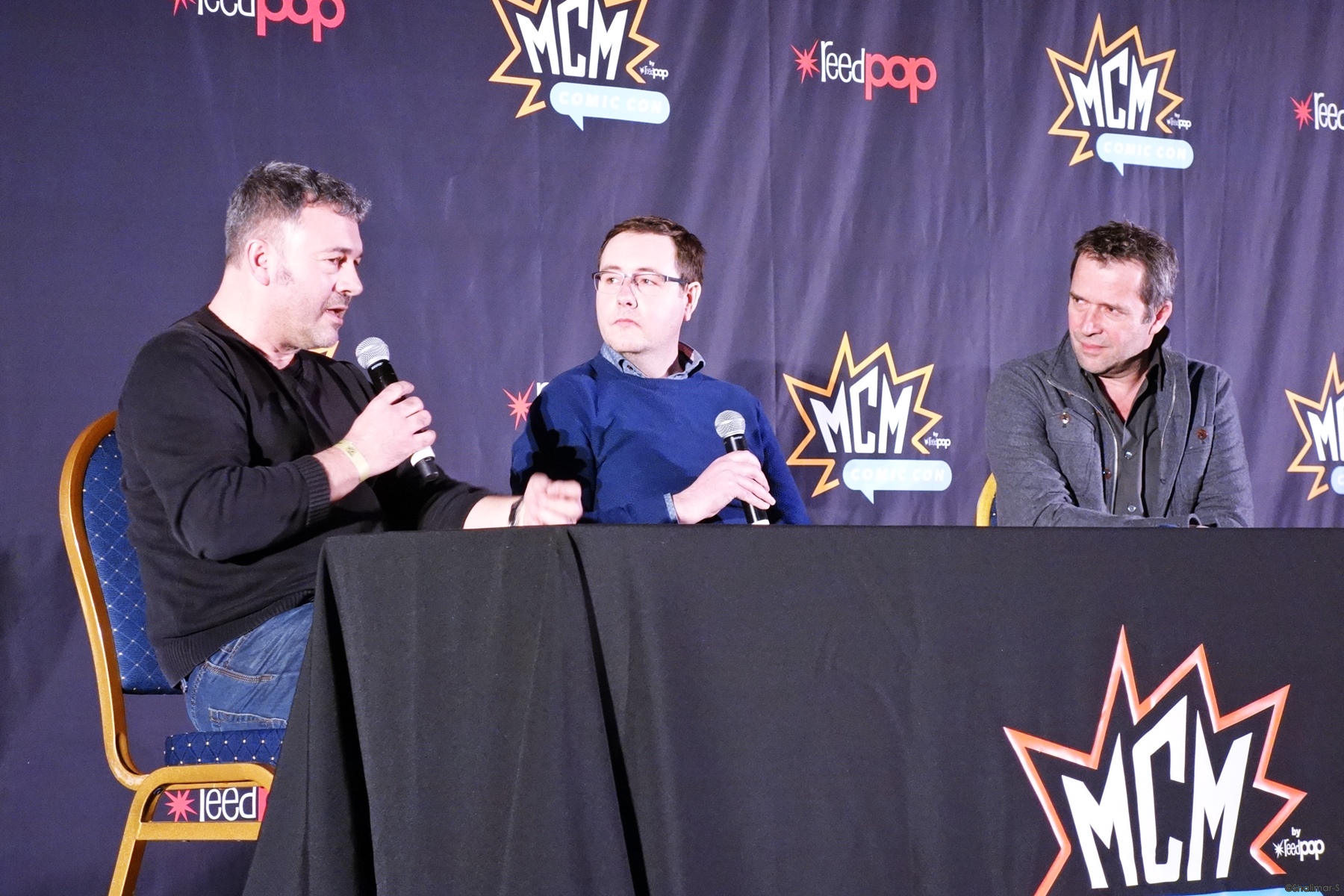 Richard mentioned that being a sci-fi geek, the idea of, “What if you get a new body and you can’t remember what happened to the old one,” sat in the back of his head for a couple of years. “I was in the mood for writing something really violent; I often am,” he continued. “That just collided with this character Kovacs and that he’s a man who does this for a living; that he steps from body-to-body and uses the bodies in the same way you use a rental car, and doesn’t much care what happens to them.”
Richard mentioned that being a sci-fi geek, the idea of, “What if you get a new body and you can’t remember what happened to the old one,” sat in the back of his head for a couple of years. “I was in the mood for writing something really violent; I often am,” he continued. “That just collided with this character Kovacs and that he’s a man who does this for a living; that he steps from body-to-body and uses the bodies in the same way you use a rental car, and doesn’t much care what happens to them.”
Ryan highlighted the line, “Your body is not who you are,” spoken in the series by the character Quellcrist Falconer (Renée Elise Goldsberry). Feeling it was an interesting and philosophical feature of the show, he asked the two for their thoughts.
“When I wrote the book, I hadn’t thought as much about it as I probably should have,” said Richard. “I was working off the basis that your core self really is contained in your brain. Now, 20 years later, I’m a lot less convinced of that and a lot of the science is starting to say different things. So I suspect it’s a much more vexed question. It’s a lot harder to know where the boundaries are.” He also hoped that the show would receive a second season, feeling that there was a lot more of this that could be explored.
“Certainly when you watch the show, the questions that are thrown are an awful lot to do with how much of our identity is bound up by the physical thing that we are,” said James. He recounted when he was doing publicity for the show with Renée Elise Goldsberry, saying, “One of the things she kept talking about was how her character had chosen to be an African American woman, a woman of colour, and how much that says about her as a character.”
James also highlighted a scene in the first episode, where a murdered seven-year-old girl is ‘resleeved’ in the only body her parents could afford – the body of a middle-aged woman. “She’s a 45-year-old crackhead,” said James. “What does that do to a seven-year-old girl, then suddenly looking in the mirror and seeing somebody else? These are the questions that are thrown up, the things you end up talking endlessly into the night about.”
James was then asked what he did to help create the character Laurens Bancroft. He replied saying that he looked at people that seemed to be ahead of their time, such as Elon Musk, Larry Page and Steve Jobs. “I spent a great deal of time looking out the window… because I needed to really meditate on what it would be like to be 350 years old and think about what kind of man you would become if you had lived in this body for 350 years.”
The conversation moved towards bringing Altered Carbon to the screen, which would not have happened were it not for showrunner Laeta Kalogridis. “She optioned it in 2010, but she’d been after it since 2002,” said Richard, who then explained that the book was initially optioned for a movie by producer Joel Silver for Warner Bros., right after it was published. “It turns out Laeta Kalogridis had read the book and wanted to option it back then, but Joel Silver had beat her to the punch. So she actually went to my Hollywood agent and said, ‘Look, when this doesn’t get made, and it won’t, because they don’t understand the material, you come back to me then.’ It took eight years. Warner Bros. kept paying me for eight years, which was lovely.”
As soon as it fell out of option, Laeta immediately picked it up and then called Richard. He described the call, saying, “She said, ‘Look, I got to be honest with you Richard, there’s a pretty good chance I can’t get this made. The thing is, it’s a passion project for me, I really, really wanted to do this. But, at the same time, I’ve got a day job. I’ve got other projects I have to work on, I’m the breadwinner for my family, I can not have it front and centre. But I promise you I will do my very, very best to get it on screen.’”
Richard said that the day after this call he spoke to his literary agent who asked how it went. “I said, ‘Ooh, she told me she wasn’t sure if she could get it made, so I’m definitely going with her.’ When you’ve been dealing with Hollywood for a while, you get sick of hearing (puts on brash American accent), ‘This is great, this is going to be fantastic, we’re going to knock it out of the park.’ The thing about Laeta is she always underpromised, and she has massively overdelivered.”
Richard went on to explain that one of the difficulties in adapting Altered Carbon into a movie was the length of the script. Initially over three hours long, they eventually got it to just under two and a half hours. “She didn’t want to cut the book,” said Richard. “She wanted to try and capture the spirit of the book.” Unfortunately, no studio in Hollywood wanted to back a lengthy sci-fi movie. Richard said that after four years, Laeta came back to him and told him that she could not make it happen as a movie, but asked how he felt about a TV show. “I said, ‘Yeah, I think that would be great.’ And, BANG. Not just a TV movie, but a TV movie with the premier streaming system on the planet. A TV movie that didn’t even go to pilot. It was commissioned immediately, on pitch, ten episodes, and they maxed out the budget. So I’m in awe, I’m on my knees, Laeta is a force of nature, she really is. She’s a fucking Valkyrie.” Richard also mentioned that his contract with the show had him as a consultant, which involved him in the casting process as well as going over the drafts of the scripts.
 Ryan noted how a show like Altered Carbon would most likely have ended up a PG-13 had it been released as a movie, and that the last few years had seen some incredible, high-quality television programmes, which have been less censorious. “I’ve never been very enthusiastic about this thing you vaguely describe as YA (Young Adult),” said Richard. “Not that there isn’t an enormous amount of really good YA material out there, I just don’t agree with the label. The idea that there are young adults who somehow can’t handle adult… adult material just seems like a weird way of looking at things.” Richard also compared it to the comic book industry and the Comics Code Authority which began in the 1950s and continued up to 2011.
Ryan noted how a show like Altered Carbon would most likely have ended up a PG-13 had it been released as a movie, and that the last few years had seen some incredible, high-quality television programmes, which have been less censorious. “I’ve never been very enthusiastic about this thing you vaguely describe as YA (Young Adult),” said Richard. “Not that there isn’t an enormous amount of really good YA material out there, I just don’t agree with the label. The idea that there are young adults who somehow can’t handle adult… adult material just seems like a weird way of looking at things.” Richard also compared it to the comic book industry and the Comics Code Authority which began in the 1950s and continued up to 2011.
“The show has taken quite a lot of flak for nudity, sexualised violence, violence in general,” continued Richard. “I’m finding it all a bit strange, because it’s like, ‘Well, have you looked out of a fucking window recently? That’s the point‘ The point is that if you’re attempting to capture something of the human condition, those things are all part and parcel of the human condition. That’s not to say that there aren’t good and bad ways of handling it. It can be done in a manner that is extremely exploitative, it can be done in a manner that attempts to address the issue. It’s not that, but it’s this blanket ban idea.” He then highlighted the MPAA as an example and called them “so remiss in their vision, because the people who are on those boards are very backwards in what they consider acceptable and not.”
“Drama has always been full of violence,” said James on the subject. “Violence has always been a part of our drama because it’s a part of the human condition. The argument is only ever about context. What does it mean? How is it done and what is it done for? Does it shed light? Does it hold a mirror up to nature? Does it teach us anything new about ourselves?”
Ryan then asked how social media had affected television. “It’s a double-edged sword,” said Richard, who revealed that he is on Twitter himself. “You can communicate with people in a way that wouldn’t have been feasible, even a couple of years ago, and that’s all great. And word of mouth obviously is a big part of that. But, as with anything, it also is affected by the worst aspects of human behaviour and so you get this kind of mobbing on Twitter, and dogpiling.”
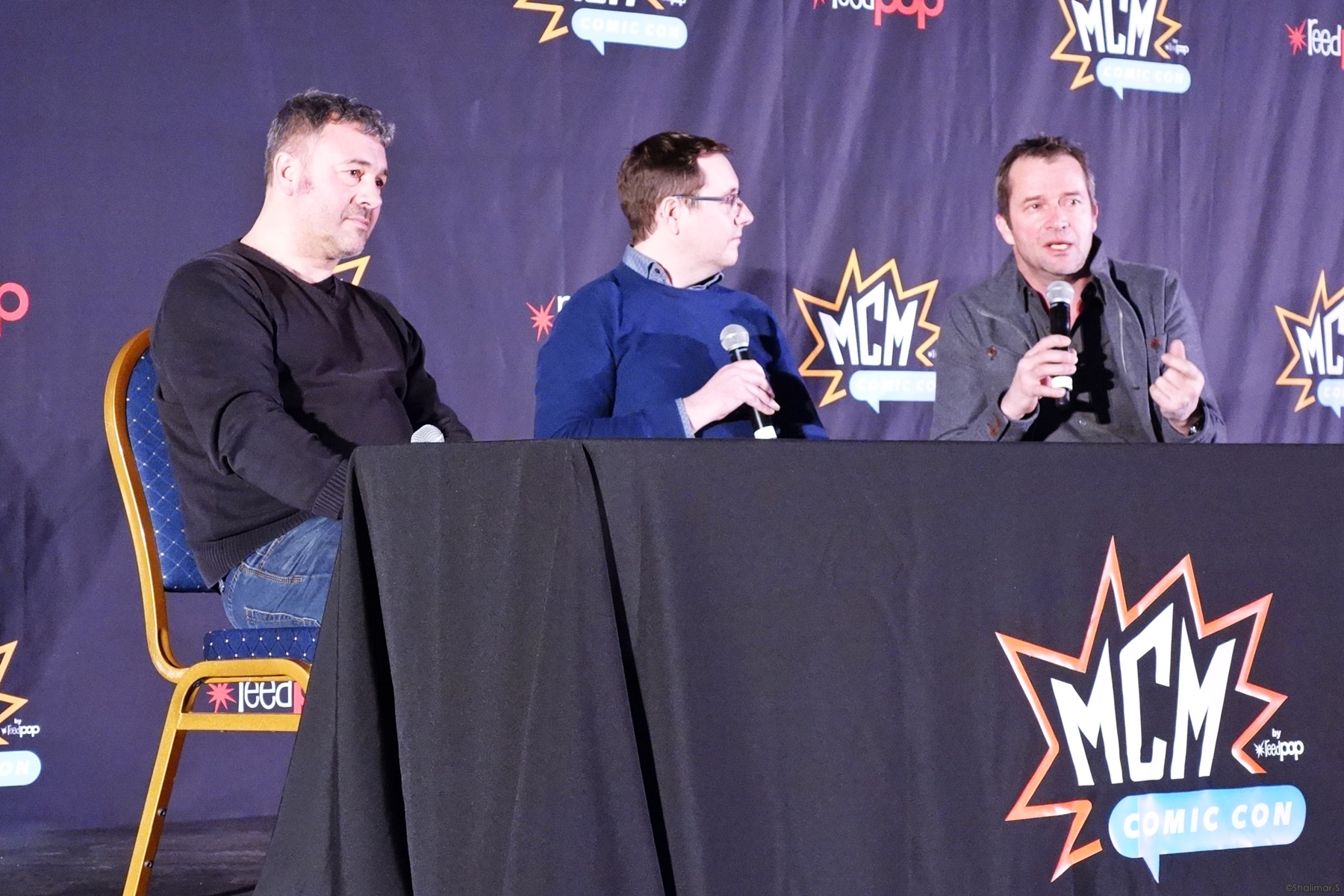 “It’s the democratisation of peoples voices, isn’t it?” said James of social media. “It means everybody gets a voice. Just… some voices are just… shit aren’t they.” This was followed by a round of applause.
“It’s the democratisation of peoples voices, isn’t it?” said James of social media. “It means everybody gets a voice. Just… some voices are just… shit aren’t they.” This was followed by a round of applause.
A question from the audience had the two being asked about their thoughts on the Netflix influence and how it is changing the way television is made. “I was very pleased when I heard that Netflix was picking it up,” said Richard, as he highlighted that he had already watched a few Netflix originals, notably Beasts of No Nation, calling it “a movie that would never, ever in a million years have got made by any studio in America.” He found it astonishing that someone had stumped up the cash to produce a bleak movie.
James called it “very thrilling” and “very exciting” as he compared the work and release of Altered Carbon to the previous model of making a TV show, saying, “When you do a show for Netflix, at the touch of a button it goes out to 190 countries simultaneously.” He also added that he felt Altered Carbon was a very global show. “It feels like it’s a show that anybody in the world can watch. I like Netflix. I like watching shit when I want to watch it, not when a scheduler tells me to watch it.”
Originally published on MyM Buzz on 20 March 2018.
